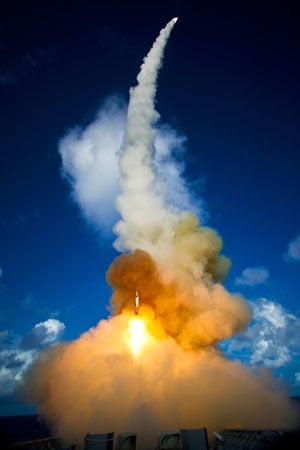Two experts in missile defense—Lieutenant General Henry A. Obering III (ret.), former director of the Missile Defense Agency (MDA), and Rebeccah Heinrichs, an adjunct fellow at the Foundation for Defense of Democracies—wrote a letter countering Yousaf Butt’s claim that the ballistic missile defense testing program comprises of “essentially rigged tests, where the intercept team knew the precise timing and trajectory of the incoming missile.”
Take an expert’s word for it: General Obering oversaw as many as six Ground-Based Midcourse Defense (GMD) tests during his tenure as a director of the MDA. He also oversaw more than 10 Aegis sea-based missile defense tests and other Theatre High Altitude Area Defense tests. He knows these tests inside out on both the classified and the unclassified sides.
In the real world, say Obering and Heinrichs, missile defense crews would have some information about the timing of the enemy attack, “due to the physics of ballistic missiles [and] the trajectory of the target.” The locations of Iran and North Korea are not secret, and it is likely that the U.S. intelligence community would pick up signs of preparations for a launch. Recent GMD tests proved that the kill vehicle on the interceptor was able to lock in the warhead against challenging background and amid decoys, countermeasures, and debris. Contrary to Butt’s assertions, it would not be easy for U.S. enemies to actually launch decoys.
It is important not to measure a success or a failure of a missile defense test according to whether the intercept occurred or not. It is far more important to determine whether the U.S. learned something new from the test and advanced ballistic missile defense technology. In that regard, the U.S. missile defense engineering community values “failed” tests as much as or even more than “successful” ones, because it tends to learn more from those tests that “go wrong” in some way. Once U.S. scientists know what went wrong, they can fix it.
In addition, the criterion of cost effectiveness for missile defenses has been defined too narrowly in the U.S., because it is important to consider not only the value of on the incoming missile against the interceptor but also the value of the defended area.
